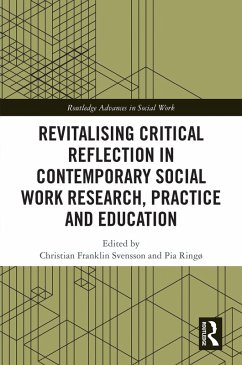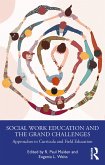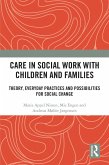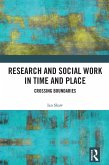Revitalising Critical Reflection in Contemporary Social Work Research, Practice and Education (eBook, ePUB)
Redaktion: Svensson, Christian Franklin; Ringø, Pia
41,95 €
41,95 €
inkl. MwSt.
Sofort per Download lieferbar

21 °P sammeln
41,95 €
Als Download kaufen

41,95 €
inkl. MwSt.
Sofort per Download lieferbar

21 °P sammeln
Jetzt verschenken
Alle Infos zum eBook verschenken
41,95 €
inkl. MwSt.
Sofort per Download lieferbar
Alle Infos zum eBook verschenken

21 °P sammeln
Revitalising Critical Reflection in Contemporary Social Work Research, Practice and Education (eBook, ePUB)
Redaktion: Svensson, Christian Franklin; Ringø, Pia
- Format: ePub
- Merkliste
- Auf die Merkliste
- Bewerten Bewerten
- Teilen
- Produkt teilen
- Produkterinnerung
- Produkterinnerung

Bitte loggen Sie sich zunächst in Ihr Kundenkonto ein oder registrieren Sie sich bei
bücher.de, um das eBook-Abo tolino select nutzen zu können.
Hier können Sie sich einloggen
Hier können Sie sich einloggen
Sie sind bereits eingeloggt. Klicken Sie auf 2. tolino select Abo, um fortzufahren.

Bitte loggen Sie sich zunächst in Ihr Kundenkonto ein oder registrieren Sie sich bei bücher.de, um das eBook-Abo tolino select nutzen zu können.
Globally, social work faces increasingly complex cultural, political, economic, legal, organisational, technological and professional conditions.
- Geräte: eReader
- mit Kopierschutz
- eBook Hilfe
Andere Kunden interessierten sich auch für
![Decolonising and Reframing Critical Social Work (eBook, ePUB) Decolonising and Reframing Critical Social Work (eBook, ePUB)]() Sophie GoldingayDecolonising and Reframing Critical Social Work (eBook, ePUB)41,95 €
Sophie GoldingayDecolonising and Reframing Critical Social Work (eBook, ePUB)41,95 €![Social Work Education and the Grand Challenges (eBook, ePUB) Social Work Education and the Grand Challenges (eBook, ePUB)]() Social Work Education and the Grand Challenges (eBook, ePUB)31,95 €
Social Work Education and the Grand Challenges (eBook, ePUB)31,95 €![The Routledge Handbook of International Critical Social Work (eBook, ePUB) The Routledge Handbook of International Critical Social Work (eBook, ePUB)]() The Routledge Handbook of International Critical Social Work (eBook, ePUB)47,95 €
The Routledge Handbook of International Critical Social Work (eBook, ePUB)47,95 €![The Social Worker's Practice Manual (eBook, ePUB) The Social Worker's Practice Manual (eBook, ePUB)]() Neil ThompsonThe Social Worker's Practice Manual (eBook, ePUB)19,95 €
Neil ThompsonThe Social Worker's Practice Manual (eBook, ePUB)19,95 €![Care in Social Work with Children and Families (eBook, ePUB) Care in Social Work with Children and Families (eBook, ePUB)]() Maria Appel NissenCare in Social Work with Children and Families (eBook, ePUB)41,95 €
Maria Appel NissenCare in Social Work with Children and Families (eBook, ePUB)41,95 €![Language Discordant Social Work in a Multilingual World (eBook, ePUB) Language Discordant Social Work in a Multilingual World (eBook, ePUB)]() Hilde Fiva BuzunguLanguage Discordant Social Work in a Multilingual World (eBook, ePUB)41,95 €
Hilde Fiva BuzunguLanguage Discordant Social Work in a Multilingual World (eBook, ePUB)41,95 €![Research and Social Work in Time and Place (eBook, ePUB) Research and Social Work in Time and Place (eBook, ePUB)]() Ian ShawResearch and Social Work in Time and Place (eBook, ePUB)41,95 €
Ian ShawResearch and Social Work in Time and Place (eBook, ePUB)41,95 €-
-
-
Globally, social work faces increasingly complex cultural, political, economic, legal, organisational, technological and professional conditions.
Dieser Download kann aus rechtlichen Gründen nur mit Rechnungsadresse in A, B, BG, CY, CZ, D, DK, EW, E, FIN, F, GR, HR, H, IRL, I, LT, L, LR, M, NL, PL, P, R, S, SLO, SK ausgeliefert werden.
Produktdetails
- Produktdetails
- Verlag: Taylor & Francis eBooks
- Seitenzahl: 228
- Erscheinungstermin: 9. Dezember 2022
- Englisch
- ISBN-13: 9781000810226
- Artikelnr.: 66224564
- Verlag: Taylor & Francis eBooks
- Seitenzahl: 228
- Erscheinungstermin: 9. Dezember 2022
- Englisch
- ISBN-13: 9781000810226
- Artikelnr.: 66224564
- Herstellerkennzeichnung Die Herstellerinformationen sind derzeit nicht verfügbar.
Christian Franklin Svensson is a Ph.D. in anthropology and social innovation. Using ethnographic approaches and policy analysis, he has a focus on issues of welfare, civil society, social change, migration, inclusion, cross-sectoral cooperation and community. From several years of teaching and supervision, Svensson is firmly rooted in quality assurance and curriculum development in international programmes. He has been peer-reviewer for a number of journals including The Danish Anthropological Association, South Asia Research Journal, South Asian Development, Social Work and Society, The Inclusion Journal and VOLUNTAS. Svensson is an appointed external expert with the European Union Institutions; a UNESCO Inclusive Policy Lab expert; and an associate member of the Centre for the Study of Global Human Movement, University of Cambridge. Pia Ringø is Ph.D. in sociology and social work. She is associate professor of social work at the Department of Sociology and Social Work, Aalborg University, Denmark. She is the research manager of the research group SOSA addressing the specialised social work in the field of psychiatry and disability research. Pia Ringø has methodological competencies in method, theory and concept development within the social sciences and social work. Her scientific focus is on theory of science, realism, integrated analytical models and development of scientific models as ways to analyse the interaction between politics, management, knowledge and practice.
0.Preface. 1.Critical Reflection: Concepts and forms of knowledge in a
global world. 2.The sociology of knowledge: Ideology, critical reflection
and the consequences of capitalism to social work. 3.Critique in social
work research: Arguments for a synthesis between critical realism and
German critical theory. 4.Critical reflections on international social work
research: Beyond South/North divides. 5.Healing past wounds or addressing
the future? Critical social work in post-war settings. 6.Experiences of
ethnic discrimination: potentials for social change in Taiwan. 7.The Use of
Reflective Processes and Teams in the Practice of Supervision: A critical
glance. 8. Mature Law in the Nordic countries: Critical perspectives on
social work in the context of public authority. 9.From experimentalism to
governance tool: Local community work caught between emancipative goals and
the sanctioning state. 10.Learning from user perspectives: Critical
reflections in the frontline of employment oriented social work.
11.Applying a salutogenic and interactional approach to critically reflect
on perspectives on disability in social work. 12.Integration is a two-way
process: Policy and social intervention among migrants. 13.Knowing risk:
Why we need an empirical quantitative critique in social work and research.
14.Decision making and risk in social work: Critical reflections on digital
technologies. 15.Revitalising the concept of surface and depth: An
analytical tool for critical reflection. 16.The promise of social change:
Critical reflections on social innovation.
global world. 2.The sociology of knowledge: Ideology, critical reflection
and the consequences of capitalism to social work. 3.Critique in social
work research: Arguments for a synthesis between critical realism and
German critical theory. 4.Critical reflections on international social work
research: Beyond South/North divides. 5.Healing past wounds or addressing
the future? Critical social work in post-war settings. 6.Experiences of
ethnic discrimination: potentials for social change in Taiwan. 7.The Use of
Reflective Processes and Teams in the Practice of Supervision: A critical
glance. 8. Mature Law in the Nordic countries: Critical perspectives on
social work in the context of public authority. 9.From experimentalism to
governance tool: Local community work caught between emancipative goals and
the sanctioning state. 10.Learning from user perspectives: Critical
reflections in the frontline of employment oriented social work.
11.Applying a salutogenic and interactional approach to critically reflect
on perspectives on disability in social work. 12.Integration is a two-way
process: Policy and social intervention among migrants. 13.Knowing risk:
Why we need an empirical quantitative critique in social work and research.
14.Decision making and risk in social work: Critical reflections on digital
technologies. 15.Revitalising the concept of surface and depth: An
analytical tool for critical reflection. 16.The promise of social change:
Critical reflections on social innovation.
0.Preface. 1.Critical Reflection: Concepts and forms of knowledge in a
global world. 2.The sociology of knowledge: Ideology, critical reflection
and the consequences of capitalism to social work. 3.Critique in social
work research: Arguments for a synthesis between critical realism and
German critical theory. 4.Critical reflections on international social work
research: Beyond South/North divides. 5.Healing past wounds or addressing
the future? Critical social work in post-war settings. 6.Experiences of
ethnic discrimination: potentials for social change in Taiwan. 7.The Use of
Reflective Processes and Teams in the Practice of Supervision: A critical
glance. 8. Mature Law in the Nordic countries: Critical perspectives on
social work in the context of public authority. 9.From experimentalism to
governance tool: Local community work caught between emancipative goals and
the sanctioning state. 10.Learning from user perspectives: Critical
reflections in the frontline of employment oriented social work.
11.Applying a salutogenic and interactional approach to critically reflect
on perspectives on disability in social work. 12.Integration is a two-way
process: Policy and social intervention among migrants. 13.Knowing risk:
Why we need an empirical quantitative critique in social work and research.
14.Decision making and risk in social work: Critical reflections on digital
technologies. 15.Revitalising the concept of surface and depth: An
analytical tool for critical reflection. 16.The promise of social change:
Critical reflections on social innovation.
global world. 2.The sociology of knowledge: Ideology, critical reflection
and the consequences of capitalism to social work. 3.Critique in social
work research: Arguments for a synthesis between critical realism and
German critical theory. 4.Critical reflections on international social work
research: Beyond South/North divides. 5.Healing past wounds or addressing
the future? Critical social work in post-war settings. 6.Experiences of
ethnic discrimination: potentials for social change in Taiwan. 7.The Use of
Reflective Processes and Teams in the Practice of Supervision: A critical
glance. 8. Mature Law in the Nordic countries: Critical perspectives on
social work in the context of public authority. 9.From experimentalism to
governance tool: Local community work caught between emancipative goals and
the sanctioning state. 10.Learning from user perspectives: Critical
reflections in the frontline of employment oriented social work.
11.Applying a salutogenic and interactional approach to critically reflect
on perspectives on disability in social work. 12.Integration is a two-way
process: Policy and social intervention among migrants. 13.Knowing risk:
Why we need an empirical quantitative critique in social work and research.
14.Decision making and risk in social work: Critical reflections on digital
technologies. 15.Revitalising the concept of surface and depth: An
analytical tool for critical reflection. 16.The promise of social change:
Critical reflections on social innovation.







